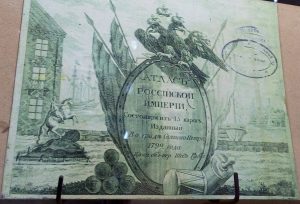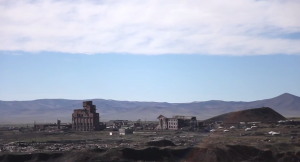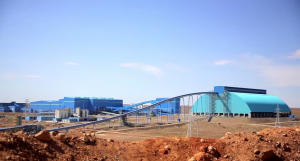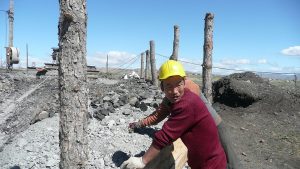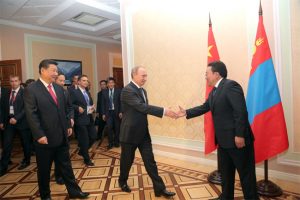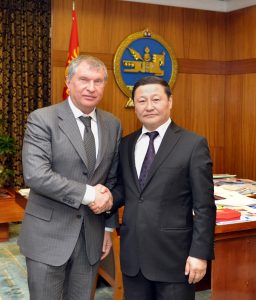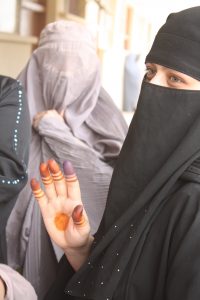Permanent Neutrality Debate in Mongolia
Memo #355 By Mendee Jargalsaikhan – mendee [at] alumni.ubc.ca Since September 2015, when President Tsakhiagiin Elbegdorj and his foreign policy team launched a campaign both domestically and abroad to institutionalize a “permanent neutrality” status, foreign policy pundits in Ulaanbaatar have been intensively debating whether or not Mongolia should enact such a policy. Beijing and Moscow have committed […]
Russia’s New Pivot to Asia: The Emergence of a New Geopolitics
Memo #341 By Alexander Korolev – akorolev [at] nus.edu.sg Many observers have recently registered a new shift in Russia’s foreign policy, labelling it, “pivot to Asia.” President Putin himself announced that “Russia’s reorientation toward the Pacific Ocean and the dynamic development in all our [Russia’s] eastern territories are our priority for the whole 21st century.” […]
How the EITI May Become Mongolian, Part 2 of 2
Memo #337 By Christopher Carter – cj [at] cj-carter.com and Dulguun Davaanyam – d.dlgn [at] alumni.ubc.ca In the second part of this video, we examine how the EITI, and more specifically the EITI report, can and has had an impact reducing the negative social, cultural, and environmental impacts of mining by empowering civil society and […]
How the EITI May Become Mongolian, Part 1 of 2
Memo #336 By Christopher Carter – cj [at] cj-carter.com and Dulguun Davaanyam – d.dlgn [at] alumni.ubc.ca As a former Soviet satellite state, Mongolia has experienced a tremendous transition to free markets and democracy over the past 15 years. Most recently, has been the realization of the country’s vast mineral wealth. In the past decade, foreign […]
Avoiding the Resource Curse in Mongolia
The Extractive Industry Transparency Initiative (EITI) in the Land of the Blue Sky Memo #332 By Christopher Carter – ultericommunications [at] gmail.com and Dulguun Davaanyam – live.environmentally.friendly [at] gmail.com Since moving out of the Soviet orbit, Mongolia has experienced tremendous economic and political change as it continues to move towards a free market and democratic […]
Mongolia – From Sino-Russian Buffer to Conversion Zone
Memo #318 By Mendee Jargalsaikhan – mendee [at] alumni.ubc.ca Last autumn, Presidents Xi Jinping and Vladimir Putin made separate visits to Mongolia, met for a tri-lateral (Russia-China-Mongolia) summit in the Tajikistan capital of Dushanbe during the leadership summit of the Shanghai Cooperation Organization (SCO), and dispatched their vice-foreign ministers for a working-level meeting in preparation for next […]
Counter-Insurgency in Afghanistan: Whose Violence is it Anyway?
Memo #305 By Dur-e-Aden – dur-e-aden [at] hotmail.com While fighting an insurgency, it is important never to harm civilians. Doing so will increase recruitment for insurgent groups and result in fuelling the conflict. This is known as the “population-centric” counter-insurgency doctrine. By this logic, it also follows that if insurgents use violence on the local […]
By Pipe and Rail: Russia in Search of Shorter Routes to Asian Markets
Memo #301 Putin Prioritizes Geo-Economics over Geo-Politics By Mendee Jargalsaikhan – mendee [at] alumni.ubc.ca Russia’s largest state-owned oil giants, Transneft and Rosneft, as well as Russian railroad authorities are again eyeing Mongolian routes as the shortest, most efficient, and safest way to Asian markets. Russia’s previous transport options to these markets—through the Russian Far East (RFE), […]
Afghanistan Elections: Why Should We Care?
Memo #284 By Dur-e-Aden – dur-e-aden [at] hotmail.com This week Afghans headed to the polls to help usher in a transfer of power from one democratic government to the next. While some observers hail this as a major achievement, others worry what lingering issues of rampant Taliban violence, ethnic politics, widespread corruption and fraud during […]
Downton Abbeystan: Why Central Asia is like Twentieth Century Upper Class England
British TV series Downton Abbey follows the Earl and Countess of Grantham in early twentieth century England as they endeavour to save the immense family estate. Viewers have been enthralled by this fictitious upper class English family’s efforts to make successful marriages for their daughters to ensure the estate remains in the family’s hands—at the time, daughters could not inherit titles and the properties that went with them.

